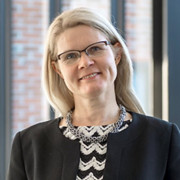An increasing number of young boys and girls in Finland believe in God. A study conducted among young people in confirmation preparation shows that a growing number of girls report believing in the existence of God. The prevalence of belief in God began to grow among boys already in 2021, and in 2024, the same phenomenon could be seen among girls as well. In 2024, 62 per cent of boys and 50 per cent of girls reported believing in the existence of God.
These are findings from a recent longitudinal study by Lecturer Jouko Porkka and Professor Kati Tervo-Niemelä among young people in confirmation preparation, examining their relationship to the Christian faith and the impact of confirmation preparation on it. In 2023, a total of 73 per cent of young people were confirmed in the Evangelical Lutheran Church of Finland.
In 2019, a little over one-third of boys in confirmation preparation believed in the existence of God. Believing in God has grown in prevalence every year since then, and by 2024, it has almost doubled so that two-thirds of boys believed in God. At the same time, the proportion of young people attending confirmation preparation decreased by only a few percentage points, which means that the increase in belief in God cannot be explained by a higher degree of selectivity among the youth. According to the researchers, the prevalence of religiosity among boys began to grow at the time of the COVID-19 pandemic and Russia’s invasion of Ukraine. In contrast, girls’ belief in the existence of God remained unchanged until last year.
“Our research clearly shows that the commitment of boys to the Christian faith has grown stronger in recent years, and believing in God is clearly more common among boys than girls. Boys are also more likely than girls to feel that confirmation preparation strengthens their faith. Other recent studies, too, have reported an increase in young men’s belief in God. Now, however, research is showing changes in girls’ religiosity as well,” says Professor of Practical Theology Kati Tervo-Niemelä.
The difference to boys is still clearly noticeable, as the proportion of boys who believe in God is 12 percentage points higher than the proportion of girls believing in God.
“However, this is the first time girls’ religiosity is changing in the same direction as that of boys. The data we’ve used are so extensive and comprehensive that there can be no question of a sampling error.”
More than 100,000 young people in confirmation preparation have responded to the annual survey between 2019 and 2024, with the 2024 response rate being 43 per cent, accounting to as much as one-third of all 15-year-olds in Finland.
“The study raises the question of whether religious interest among girls will increase in the same way as it has among boys. A change in the attitudes of young people in confirmation preparation could be the first signal of this.”
“Our data have been collected in confirmation preparation, but due to the high popularity of Lutheran confirmation, with three out of four young people attending it, the respondents represent the majority of Finnish youth.”
Religiosity among young people is in an active state of flux – further research is needed
The study also showed that the strongest believers among young people in confirmation preparation live in the central areas of large cities. There was a statistically significant difference in the responses of young people living in city centers, compared to young people living in all other areas.
According to Tervo-Niemelä, the findings challenge at least three established ideas related to religiosity. First, the idea of religiosity being in decline and of young people being less religious than their previous generations. Second, the idea of women being more religious than men, and third, the idea of people living in rural areas being more religious than their urban counterparts.
“Overall, research suggests that religiosity among young people is currently in an exceptionally active state of flux,” Tervo-Niemelä says.
According to her, the state of the world today is a possible contributing factor, as uncertainties are growing, and people’s sense of security is shaken. The increasingly multicultural atmosphere of cities may also, in her view, strengthen religiosity among young people, as beliefs are more openly visible in their daily lives.
“One can also ask whether Christianity is the new counterculture. Some parents have been critical of Christianity, viewing religion as conservative and outdated. Many parents have also left the church. Perhaps for today’s youth, being non-religious is no longer the counterculture, but rather, religiosity represents it.”
According to Tervo-Niemelä, reasons underlying growing religiosity among boys can also be found in an increasingly conservative mindset among them, and perhaps also in that confirmation preparation takes place at “a more appropriate age”, while for girls it may take place too late.
“There are likely multiple factors explaining changes in these phenomena, warranting plenty of further research and additional surveys.”
Funded by the Research Council of Finland and running until 2028, Professor Tervo-Niemelä’s recently launched project, Religion, Meaning and Masculinities: Religion in the Lives of Men in Finland, explores reasons behind changes in religiosity and the significance of religion, particularly from the perspective of men. The researchers are currently conducting interviews with young men and new fathers. Later on, data will be collected among other groups as well.
Research article:
Porkka, J., & Tervo-Niemelä, K. (2024). Poikien usko vahvistunut edelleen — seuraavatko tytöt perässä? Pitkittäistutkimus rippikoulunuorten suhteesta kristilliseen uskoon ja rippikoulun vaikutuksesta siihen. Uskonto, katsomus ja kasvatus, 4(1). https://journal.fi/ukk/article/view/154948
An online seminar to be held on Thursday, 20 February 2024, at 10–16,
Exploring Masculinities and Religion: Historical and Contemporary Perspectives through Research, will showcase new projects underway on this theme in the School of Theology at the University of Eastern Finland. The language of the seminar is English.


